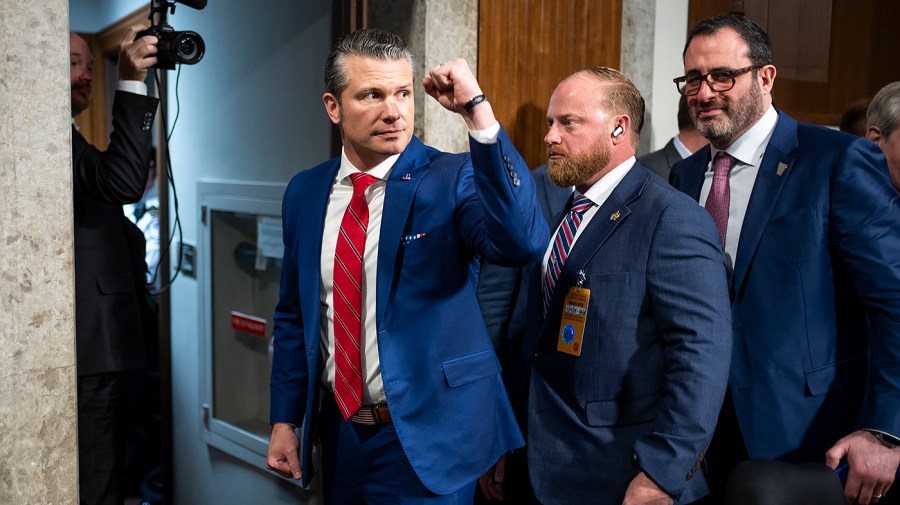The Senate voted largely along party lines Thursday to advance Pete Hegseth, President Trump’s nominee to serve as secretary of Defense, brushing aside a litany of misconduct allegations and the objections of Democrats who argued he is unqualified for the job.
The 51-49 vote to end debate on Hegseth’s nomination sets the stage for a final confirmation vote on Friday, when he is expected to secure the majority support he needs to join Trump’s Cabinet.
Republican Sens. Lisa Murkowski (Alaska) and Susan Collins (Maine) voted against Hegseth.
Trump has touted Hegseth as someone who would bring a fresh perspective to the leadership of the Pentagon, move past the “political agendas” of the Biden administration and help build the “most powerful military in the world.”
Sen. Roger Wicker (R-Miss.), the Senate Armed Services Committee chairman, who strongly supported Hegseth throughout the confirmation process, argued that the American people gave Trump “a clear mandate” to reform Washington.
He called Hegseth a “good choice” who would be “open to new ideas” and “not beholden to the status quo.”
Democrats, however, panned Hegseth as completely unqualified and unfit to lead the nation’s armed forces given his lack of managerial experience and multiple allegations of misbehavior.
Senate Democratic Leader Chuck Schumer (N.Y.) on Thursday called Hegseth, a former Fox News host who retired from the Army with the rank of major, “utterly unqualified” and among Trump’s “very worst nominees.”
“Pete Hegseth has shown himself not only incapable of running a large organization, he often shows himself incapable of showing up or showing up in a way where he could get anything done,” Schumer said.
Sen. Jack Reed (D-R.I.), the ranking member of the Armed Services panel, said Hegseth repeatedly “dodged and deferred” allegations of “disregarding the laws of war, financial mismanagement, racist and sexist remarks about men and women in uniform, alcohol abuse, sexual assault, sexual harassment and other troubling issues.”
Democrats highlighted throughout the contentious confirmation process his infidelities to multiple spouses and allegations that he got drunk at work events.
That was enough to help sway Murkowski, who announced shortly before the vote that she would vote against Hegseth, citing “significant concerns with his nomination.”
She said that managing the “department of Defense requires vast experience and expertise” and that Hegseth’s prior career experience does “not demonstrate to me that he is prepared for such immense responsibility.”
“His leadership of two veteran organizations was marked with accusations of financial mismanagement and problems with the workplace culture he fostered,” she said.
Hegseth admitted during his confirmation that he was “not a perfect person” but he vigorously denied the allegation that he sexually assaulted a woman in 2017 or that he mismanaged the finances of two veterans’ groups he ran before joining Fox News as a contributor in 2014.
But the nominee admitted to having a consensual sexual encounter with the woman who accused him of assault in 2017 while he was still married to his second wife and shortly after he fathered a child with another woman who would become his third wife.
Murkowski cited this behavior as raising serious concerns about the nominee’s judgment.
“While the allegations of sexual assault and excessive drinking do nothing to quiet my concerns, the past behaviors Mr. Hegseth has admitted to, including infidelity on multiple occasions, demonstrate a lack of judgment that is unbecoming of someone who would lead our armed forces,” she said.
The closely decided vote by the full Senate to advance Hegseth marks a remarkable turnaround for a nominee.
He appeared to be in deep trouble in early December after allegations of sexual misconduct, financial mismanagement and public drunkenness surfaced in several media outlets.
Sen. Joni Ernst (R-Iowa) said she hadn’t gotten to yes on Hegseth when asked about her position during a Fox News interview in early December, and Sen. Lindsey Graham (R-S.C.) initially called the allegations “disturbing.”
Trump even floated Florida Gov. Ron DeSantis as a possible Plan B option to head the Pentagon before changing his mind and deciding to fully back his embattled nominee.
The president’s advisers warned, however, that if he let Hegseth’s nomination go down in flames, it could embolden Democrats and produce a domino-like chain reaction of other Cabinet picks failing to advance.
Trump’s decision to double down in his support of Hegseth was backed by a strong push by the president’s allies on social media, who piled immense pressure on wavering Senate Republicans, including Ernst and Graham, to support the nominee.
Ernst and Graham announced their support after Hegseth survived a bruising confirmation hearing at which Democrats repeatedly grilled him about his drinking, his infidelity, his management of Veterans for Freedom and Concerned Veterans for America, and his view of women in combat roles.
Ernst said after the hearing that Democrats “were there just to score political points,” adding “I think they failed.”
Graham said Hegseth showed his mettle during several hours of withering criticism
“Democratic attacks were overly personal and fell flat. It was clear Pete was more prepared for the hearing than my Democratic colleagues,” he said.
Wicker held a vote Monday to report Hegseth’s nomination out of the Senate Armed Services Committee over the angry objections of Democrats on the panel, who argued that Republicans should respect the tradition of waiting at least seven days after a hearing to report a nominee to the floor.
The Armed Services panel voted along party lines, 14-13, to waive the seven-day rule and advance the nominee.
